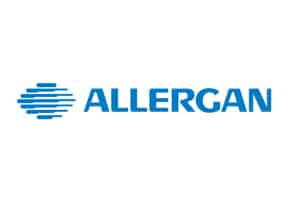
Allergan confirmed yesterday it will start pivotal trials of its DARPin treatment for wet age-related macular degeneration (AMD) in the first half of next year.
DARPin (abicipar pegol) is one of the key assets in Allergan’s pipeline and has been at the heart of its efforts to persuade shareholders that they should resist a hostile takeover from acquisitive Canadian rival Valeant.
Allergan presented some top-line findings from a phase II DARPin trial during an R&D update yesterday, suggesting it was at least as effective in treating wet AMD as Roche’s big-selling Lucentis (ranibizumab), while having a longer duration of action that means it should require fewer injections into the eye.
The company reckons that DARPin could expand the market for wet AMD – estimated to grow from around $6.3bn last year to around $10bn in 2019.
Chief executive David Pyott pointed out that Bayer’s Eylea (aflibercept) has made dramatic gains in market share since launch thanks to a more favourable dosing regimen against Lucentis, which requires monthly injections. Allergan’s DARPin could potentially offer dosing every three months, he suggested.
Such is the perceived valued of the DARPin programme that Valeant and acquisition partner Pershing were forced to bundle a contingent value right (CVR) for the programme with their most recent takeover offer, along with a commitment to fund R&D for the drug.
Allergan filed a document with the Securities & Exchange Commission (SEC) yesterday detailing why it believes programme would suffer in Valeant’s hands, noting: “missteps are likely and would have meaningful impact on the regulatory trajectory of the drug”.
Meanwhile Allergan told investors it also has high hopes for its bimatoprost sustained-release implant, which Pyott said is expected to be a “game changer” in glaucoma treatment. Data from phase II trials suggest that the implant’s efficacy is comparable to daily topical bimatoprost but lasts for four to six months per administration.
That profile – coupled with the fact that around 20 per cent of glaucoma patients are not well-managed using eyedrops – suggests the implant could make strong headway in a market tipped to reach $8bn by 2018, he added.
Migraine treatment delayed
There was mixed news for Allergan on the regulatory front however as the FDA once again rejected its inhalable acute migraine therapy Semprana (dihydroergotamine), formerly known as Levadex, citing concerns about the delivery device.
In a letter, the FDA said it needed additional reassurance on “content uniformity on the improved canister filling process and on standards for device actuation”, according to Allergan, which suggested it should be able to address the concerns with data already in hand. If that proves to be the case approval could still come through early next year.
On the plus side, Allergan said the FDA had approved a new indication for its intravitreal implant Ozurdex (dexamethasone), namely the treatment of diabetic macular oedema (DME) in adults who have an artificial lens implant or who are scheduled for cataract surgery.
Scott Whitcup, chief scientific officer at Allergan, told investors during the R&D update that the new approval strengthens the company’s position in ophthalmology and specifically retinal diseases.




